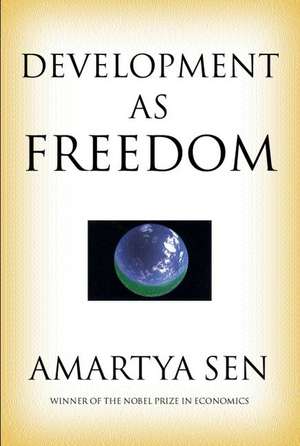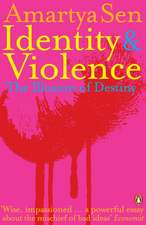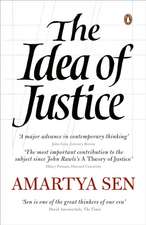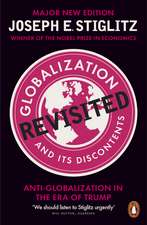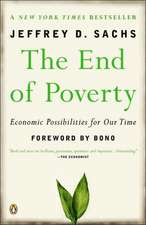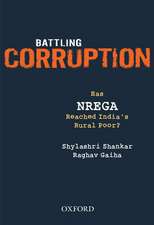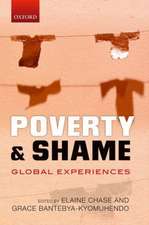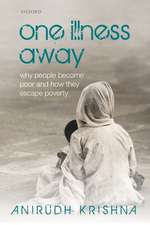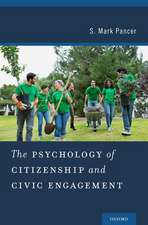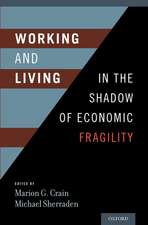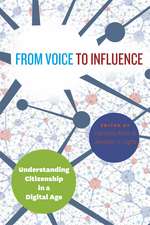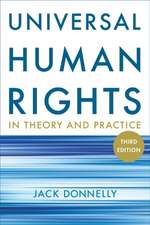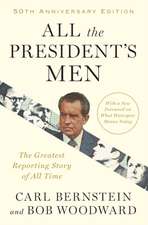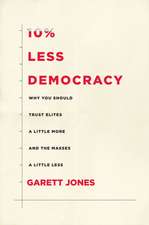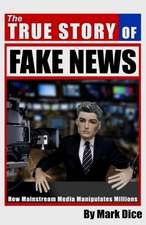Development as Freedom
Autor Amartya Senen Limba Engleză Hardback – 14 oct 1999
| Toate formatele și edițiile | Preț | Express |
|---|---|---|
| Paperback (2) | 81.53 lei 10-16 zile | +31.59 lei 7-13 zile |
| Oxford University Press – 18 ian 2001 | 81.53 lei 10-16 zile | +31.59 lei 7-13 zile |
| Anchor Books – 31 iul 2000 | 111.55 lei 3-5 săpt. | |
| Hardback (1) | 197.27 lei 31-37 zile | +79.50 lei 7-13 zile |
| OUP OXFORD – 14 oct 1999 | 197.27 lei 31-37 zile | +79.50 lei 7-13 zile |
Preț: 197.27 lei
Preț vechi: 241.44 lei
-18% Nou
Puncte Express: 296
Preț estimativ în valută:
37.75€ • 41.13$ • 31.81£
37.75€ • 41.13$ • 31.81£
Carte tipărită la comandă
Livrare economică 12-18 aprilie
Livrare express 19-25 martie pentru 89.49 lei
Preluare comenzi: 021 569.72.76
Specificații
ISBN-13: 9780198297581
ISBN-10: 0198297580
Pagini: 384
Ilustrații: illustrations
Dimensiuni: 162 x 242 x 26 mm
Greutate: 0.69 kg
Editura: OUP OXFORD
Colecția OUP Oxford
Locul publicării:Oxford, United Kingdom
ISBN-10: 0198297580
Pagini: 384
Ilustrații: illustrations
Dimensiuni: 162 x 242 x 26 mm
Greutate: 0.69 kg
Editura: OUP OXFORD
Colecția OUP Oxford
Locul publicării:Oxford, United Kingdom
Recenzii
The world's poor and dispossed could have no more articulate or insightful a champion among economists than Amartya Sen. By showing that the quality of our lives should be measured not by our wealth but by our freedom, his writings have revolutionized the theory and practice of development. The United Nations, in its own development work, has benefited immensely from the wisdom and good sense of Professor Sen's views. Kofi A. Annan, Secretary-General of the United Nations
In this book, Amartya Sen develops elegantly, compactly, and yet broadly the concept that economic development is in its nature an increase in freedom. By historical examples, empirical evidence, and forceful and rigorous analysis, he shows how development, broadly and properly conceived, cannot be antagonistic to liberty but consists precisely in its increase. Kenneth J. Arrow, Nobel Laureate in Economic Science
Amartya Sen has made several key contributions to research on fundamental problems in welfare economics. By combining tools from economics and philosophy, he has restored an ethical dimension to the discussion of vital economic problems. From the Royal Swedish Academy Announcement of the Award of the 1998 Nobel Prize in Economic Science
The connecting theme behind these essays is that development is about expanding people's ability to do things that they have a reason to value. The rationale for this is discussed with great force, clarity and consistency.
the ideas are presented in a very accessible, nontechnical language. The writing is lucid with interesting story-telling openings ... a topical and timely appeal to an audience that cuts across disciplines.
a brilliant book. Sen ranges over a vast intellectual landscape ... Many authors try this kind of tour d'horizon but few succeed as well as Amartya Sen. He is a multi-faceted scholar who has thought deeply and rigorously and has published extensively. Although Development as Freedom covers imense territory, it is subtle and nuanced and its careful scholarship is manifest at every turn.
Sen has looked for ways to empower the poor ... Development as Freedom is a testament to Sen's unwavering commitment to the task ... this is economics that should be read: not merely for the elegance of its arguments or the wisdom of its judgements, but for the deep and burnished humanity that animates it.
Development as Freedom is a personal manifesto: a summing up; a blend of vision, close argument, reflection and reminiscence.
In this book, Amartya Sen develops elegantly, compactly, and yet broadly the concept that economic development is in its nature an increase in freedom. By historical examples, empirical evidence, and forceful and rigorous analysis, he shows how development, broadly and properly conceived, cannot be antagonistic to liberty but consists precisely in its increase. Kenneth J. Arrow, Nobel Laureate in Economic Science
Amartya Sen has made several key contributions to research on fundamental problems in welfare economics. By combining tools from economics and philosophy, he has restored an ethical dimension to the discussion of vital economic problems. From the Royal Swedish Academy Announcement of the Award of the 1998 Nobel Prize in Economic Science
The connecting theme behind these essays is that development is about expanding people's ability to do things that they have a reason to value. The rationale for this is discussed with great force, clarity and consistency.
the ideas are presented in a very accessible, nontechnical language. The writing is lucid with interesting story-telling openings ... a topical and timely appeal to an audience that cuts across disciplines.
a brilliant book. Sen ranges over a vast intellectual landscape ... Many authors try this kind of tour d'horizon but few succeed as well as Amartya Sen. He is a multi-faceted scholar who has thought deeply and rigorously and has published extensively. Although Development as Freedom covers imense territory, it is subtle and nuanced and its careful scholarship is manifest at every turn.
Sen has looked for ways to empower the poor ... Development as Freedom is a testament to Sen's unwavering commitment to the task ... this is economics that should be read: not merely for the elegance of its arguments or the wisdom of its judgements, but for the deep and burnished humanity that animates it.
Development as Freedom is a personal manifesto: a summing up; a blend of vision, close argument, reflection and reminiscence.
Notă biografică
Amartya Sen is the Master of Trinity College Cambridge and the winner of the 1998 Nobel Prize in Economic Science. He has been President of the Indian Economic Association, the American Economic Association, the International Economic Association and the Econometrics Society. He has taught at Oxford, Cambridge, Harvard and the London School of Economics.
Extras
We live in a world of unprecedented opulence of a kind that would have been hard even to imagine a century or two ago. There have also been remarkable changes beyond the economic sphere. The twentieth century has established democratic and participatory governance as the preeminent model of political organization. Concepts of human rights and political liberty are now very much a part of the prevailing rhetoric. People live much longer, on an average, than ever before. Also, the different regions of the globe are now more closely linked than they have ever been. This is so not only in the fields of trade, commerce and communication, but also in terms of interactive ideas and ideals.
And yet we also live in a world with remarkable deprivation, destitution and oppression. There are many new problems as well as old ones, including persistence of poverty and unfulfilled elementary needs, occurrence of famines and widespread hunger, violation of elementary political freedoms as well as of basic liberties, extensive neglect of the interests and agency of women and worsening threats to our environment and to the sustainability of our economic and social lives. Many of these deprivations can be observed, in one form or another, in rich countries as well as poor ones.
Overcoming these problems is a central part of the exercise of development. We have to recognize, it is argued here, the role of freedoms of different kinds in countering these afflictions. Indeed, individual agency is, ultimately, central to addressing these deprivations. On the other hand, the freedom of agency that we have individually is inescapably qualified and constrained by the social, political and economic opportunities that are available to us. There is a deep complementarity between individual agency and social arrangements. It is important to give simultaneous recognition to the centrality of individual freedom and to the force of social influences on the extent and reach of individual freedom. To counter the problems that we face, we have to see individual freedom as a social commitment. This is the basic approach that this work tries to explore and examine.
Expansion of freedom is viewed, in this approach, both as the primary end and as the principal means of development. Development consists of the removal of various types of unfreedoms that leave people with little choice and little opportunity of exercising their reasoned agency. The removal of substantial unfreedoms, it is argued here, is constitutive of development. However, for a fuller understanding of the connection between development and freedom we have to go beyond that basic recognition (crucial as it is). The intrinsic importance of human freedom, in general, as the preeminent objective of development has to be distinguished from the instrumental effectiveness of freedoms of particular kinds to promote freedoms of other kinds.
The linkages between different types of freedoms are empirical and causal, rather than constitutive and compositional. For example, there is strong evidence that economic and political freedoms help to reinforce one another, rather than being hostile to one another (as they are sometimes taken to be). Similarly, social opportunities of education and health care, which may require public action, complement individual opportunities of economic and political participation and also help to foster our own initiatives in overcoming our respective deprivations. If the point of departure of the approach lies in the identification of freedom as the main object of development, the reach of the policy analysis lies in establishing the empirical linkages that make the viewpoint of freedom coherent and cogent as the guiding perspective of the process of development.
This work outlines the need for an integrated analysis of economic, social and political activities, involving a variety of institutions and many interactive agencies. It concentrates particularly on the roles and interconnections between certain crucial instrumental freedoms, including economic opportunities, political freedoms, social facilities, transparency guarantees, and protective security. Societal arrangements, involving many institutions (the state, the market, the legal system, political parties, the media, public interest groups and public discussion forums, among others) are investigated in terms of their contribution to enhancing and guaranteeing the substantive freedoms of individuals, seen as active agents of change, rather than as passive recipients of dispensed benefits.
The book is based on five lectures I gave as a Presidential Fellow at the World Bank during the fall of 1996. There was also one follow-up lecture in November 1997 dealing with the overall approach and its implications. I appreciated the opportunity and the challenge involved in this task, and I was particularly happy that this happened at the invitation of President James Wolfensohn, whose vision, skill and humanity I much admire. I was privileged to work closely with him earlier as a Trustee of the Institute for Advanced Study at Princeton, and more recently, I have also watched with great interest the constructive impact of Wolfensohn's leadership on the Bank.
The World Bank has not invariably been my favorite organization. The power to do good goes almost always with the possibility to do the opposite, and as a professional economist, I have had occasions in the past to wonder whether the Bank could not have done very much better. These reservations and criticisms are in print, so I need not make a "confession" of harboring skeptical thoughts. All this made it particularly welcome to have the opportunity to present at the Bank my own views on development and on the making of public policy.
This book, however, is not intended primarily for people working at or for the Bank, or other international organizations. Nor is it just for policy makers and planners of national governments.
Rather, it is a general work on development and the practical reasons underlying it, aimed particularly at public discussion. I have rearranged the six lectures into twelve chapters, both for clarity and to make the written version more accessible to nonspecialist readers. Indeed, I have tried to make the discussion as nontechnical as possible, and have referred to the more formal literature--for those inclined in that direction--only in endnotes. I have also commented on recent economic experiences that occurred after my lectures were given (in 1996), such as the Asian economic crisis (which confirmed some of the worst fears I had expressed in those lectures).
In line with the importance I attach to the role of public discussion as a vehicle of social change and economic progress (as the text will make clear), this work is presented mainly for open deliberation and critical scrutiny. I have, throughout my life, avoided giving advice to the "authorities." Indeed, I have never counseled any government, preferring to place my suggestions and critiques--for what they are worth--in the public domain. Since I have been fortunate in living in three democracies with largely unimpeded media (India, Britain, and the United States), I have not had reason to complain about any lack of opportunity of public presentation. If my presentation here arouses any interest, and leads to more public discussion of these vital issues, I would have reason to feel well rewarded.
And yet we also live in a world with remarkable deprivation, destitution and oppression. There are many new problems as well as old ones, including persistence of poverty and unfulfilled elementary needs, occurrence of famines and widespread hunger, violation of elementary political freedoms as well as of basic liberties, extensive neglect of the interests and agency of women and worsening threats to our environment and to the sustainability of our economic and social lives. Many of these deprivations can be observed, in one form or another, in rich countries as well as poor ones.
Overcoming these problems is a central part of the exercise of development. We have to recognize, it is argued here, the role of freedoms of different kinds in countering these afflictions. Indeed, individual agency is, ultimately, central to addressing these deprivations. On the other hand, the freedom of agency that we have individually is inescapably qualified and constrained by the social, political and economic opportunities that are available to us. There is a deep complementarity between individual agency and social arrangements. It is important to give simultaneous recognition to the centrality of individual freedom and to the force of social influences on the extent and reach of individual freedom. To counter the problems that we face, we have to see individual freedom as a social commitment. This is the basic approach that this work tries to explore and examine.
Expansion of freedom is viewed, in this approach, both as the primary end and as the principal means of development. Development consists of the removal of various types of unfreedoms that leave people with little choice and little opportunity of exercising their reasoned agency. The removal of substantial unfreedoms, it is argued here, is constitutive of development. However, for a fuller understanding of the connection between development and freedom we have to go beyond that basic recognition (crucial as it is). The intrinsic importance of human freedom, in general, as the preeminent objective of development has to be distinguished from the instrumental effectiveness of freedoms of particular kinds to promote freedoms of other kinds.
The linkages between different types of freedoms are empirical and causal, rather than constitutive and compositional. For example, there is strong evidence that economic and political freedoms help to reinforce one another, rather than being hostile to one another (as they are sometimes taken to be). Similarly, social opportunities of education and health care, which may require public action, complement individual opportunities of economic and political participation and also help to foster our own initiatives in overcoming our respective deprivations. If the point of departure of the approach lies in the identification of freedom as the main object of development, the reach of the policy analysis lies in establishing the empirical linkages that make the viewpoint of freedom coherent and cogent as the guiding perspective of the process of development.
This work outlines the need for an integrated analysis of economic, social and political activities, involving a variety of institutions and many interactive agencies. It concentrates particularly on the roles and interconnections between certain crucial instrumental freedoms, including economic opportunities, political freedoms, social facilities, transparency guarantees, and protective security. Societal arrangements, involving many institutions (the state, the market, the legal system, political parties, the media, public interest groups and public discussion forums, among others) are investigated in terms of their contribution to enhancing and guaranteeing the substantive freedoms of individuals, seen as active agents of change, rather than as passive recipients of dispensed benefits.
The book is based on five lectures I gave as a Presidential Fellow at the World Bank during the fall of 1996. There was also one follow-up lecture in November 1997 dealing with the overall approach and its implications. I appreciated the opportunity and the challenge involved in this task, and I was particularly happy that this happened at the invitation of President James Wolfensohn, whose vision, skill and humanity I much admire. I was privileged to work closely with him earlier as a Trustee of the Institute for Advanced Study at Princeton, and more recently, I have also watched with great interest the constructive impact of Wolfensohn's leadership on the Bank.
The World Bank has not invariably been my favorite organization. The power to do good goes almost always with the possibility to do the opposite, and as a professional economist, I have had occasions in the past to wonder whether the Bank could not have done very much better. These reservations and criticisms are in print, so I need not make a "confession" of harboring skeptical thoughts. All this made it particularly welcome to have the opportunity to present at the Bank my own views on development and on the making of public policy.
This book, however, is not intended primarily for people working at or for the Bank, or other international organizations. Nor is it just for policy makers and planners of national governments.
Rather, it is a general work on development and the practical reasons underlying it, aimed particularly at public discussion. I have rearranged the six lectures into twelve chapters, both for clarity and to make the written version more accessible to nonspecialist readers. Indeed, I have tried to make the discussion as nontechnical as possible, and have referred to the more formal literature--for those inclined in that direction--only in endnotes. I have also commented on recent economic experiences that occurred after my lectures were given (in 1996), such as the Asian economic crisis (which confirmed some of the worst fears I had expressed in those lectures).
In line with the importance I attach to the role of public discussion as a vehicle of social change and economic progress (as the text will make clear), this work is presented mainly for open deliberation and critical scrutiny. I have, throughout my life, avoided giving advice to the "authorities." Indeed, I have never counseled any government, preferring to place my suggestions and critiques--for what they are worth--in the public domain. Since I have been fortunate in living in three democracies with largely unimpeded media (India, Britain, and the United States), I have not had reason to complain about any lack of opportunity of public presentation. If my presentation here arouses any interest, and leads to more public discussion of these vital issues, I would have reason to feel well rewarded.
